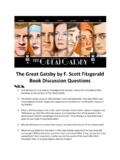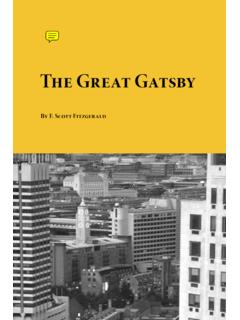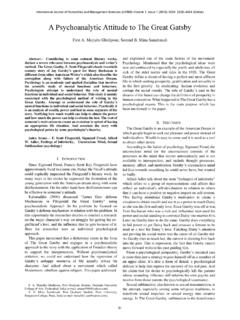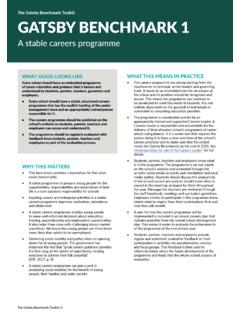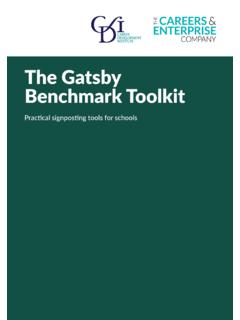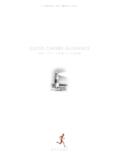Transcription of Tasks for The Great Gatsby, chapter 6 - wildbilly.dk
1 Tasks for The Great gatsby , chapter 6 Group 1:Look up the term bootlegging/bootlegger . Explain the term and its historical relevance. Find photos and illustrations and discuss how the term moral decay is portrayed in The Great 2:Read the text below. Find the main points and relate them to the quote from chapter ) Looming over all of American history--but particularly the country's formative years--is the Biblical figure of Adam, the only person, according to the West's major religions, to have lived unburdened by what came before him. As literary critic Lewis wrote in 1955, in his wonderful book The American Adam, early generations of Americans became captivated by the ideathat they could create a future without reference to the past.
2 The revolutionaries who fought for America's independence saw themselves as breaking not only with the Old World but with history itself. "The case and circumstances of America present themselves as in the beginning of a world," Thomas Paine wrote in 1792. Thomas Jefferson believed the new nation should regularly renew itself, arguing that, if necessary, "[t]he tree of liberty must be refreshed .. with the blood of patriots and tyrants." But, as Lewis explains, it was after the War of 1812--after the United States had finallycut loose from Great Britain and other foreign entanglements--that the notion of a country unbound from the constraints of history really began to take root. Democratic Review--the magazine of a nineteenth-century progressive movement known as Young America--captured this sentiment in 1839, when it editorialized, "[O]ur national birth was the beginning of a new history.
3 Which separates us from the past and connects us with the future only."According to this line of thought, each generation of Americans could always start over and transform their country. [..] "The expansive future is our arena," wrote Democratic Review. "We areentering on its untrodden space .. with a clear conscience unsullied by the past."In hisStudies in Classic American Literature, which appeared in 1923, Lawrence identified thecelebration of the new and the rejection of the old as "the true myth of America." According to this myth, Lawrence wrote, America "starts old, old, wrinkled and writhing in an old skin. And there is agradual sloughing of the old skin, towards a new youth." The myth of America as Adam runs through our country's literature [.]
4 ] (from J. Judis, American Adam b) The Great gatsby , chapter 6: The truth was that Jay gatsby , of West Egg, Long Island, sprang from his Platonic conception of himself. He was a son of God a phrase which, if it means anything, means just that and he must be about His Father s business, the service of a vast, vulgar, 2and meretricious beauty. So he invented just the sort of Jay gatsby that a seventeen year old boy would be likely to invent, and tothis conception he was faithful to the end. 3 Group 3:Analyse the poem below and relate it to The Great gatsby . Richard Cory (1897)BY EDWIN ARLINGTON ROBINSONW henever Richard Cory went down town,We people on the pavement looked at him:He was a gentleman from sole to crown,Clean favored, and imperially he was always quietly arrayed,And he was always human when he talked;But still he fluttered pulses when he said,"Good-morning," and he glittered when he he was rich yes, richer than a king And admirably schooled in every grace:In fine, we thought that he was everythingTo make us wish that we were in his on we worked, and waited for the light,And went without the meat, and cursed the bread;And Richard Cory, one calm summer night,Went home and put a bullet through his 4:Read the text below.
5 Find the main points and discuss them in relation to The Great gatsby . Focus on chapter 6 in rise and fall; they blossom and wither away into the backwaters of history. Societies are defined by those who inhabit them, but strangely, inversely, people are also imprints of the societiesthey inhabit. There is an ebb and flow, where the individual affects and is affected by the group invarying levels of extremity. F. Scott Fitzgerald breathed these tides of humanity, and during his lifetime witnessed one of the greatest Platonic Conceptions of society to crash upon modern times: the Roarin decade fed off of itself, growing larger and larger as the people grew more affected by, and, in turn, caused the explosion of the consumerism and greed that marked the era.
6 It was a giant step, a lurch, away from Jay gatsby would lie in his bed at night, a universe of ineffable gaudiness spun itself out in his Imprinted by a society that placed increasing amounts of social importance on wealth, on the appearance of success, gatsby viewed a fantastic and grotesque fantasy that fulfilled every desire of cheap and, in actuality, worthless material wealth. For five years, he fantasizes about the woman he desires, the wonderful, white, Daisy whose voice is full of money. These fantasies provide gatsby a hint at the unreality of reality, the secret that everything around him was simply a woven fantasy, an ephemeral dream with no weight or meaning, able to float freely in his ghostlyheart.
7 Jay gatsby s emotional response to the world around him is to disappear into fantasy until the oblivious, disaffected embrace of sleep can finally wrest him reaction, or more accurately Fitzgerald s writing of it, can reveal something about human naturein are matters not what the social definition of the age may be, we dream and we plan and we scheme about fulfilling that standard. Fitzgerald was provided with a unique opportunity to capture this essence; he lived in a time where that standard was material and quantifiable. Fitzgerald was equally opportunely positioned to make an impassioned case that the standard supporting 20s society was wrong. If we are dreamers, and we live to fulfill the ideals of the society we inhabit, andthat society s standard has shifted and degenerated into something meaningless and empty, then we in turn become meaningless and empty ghosts.
8 It was that meaninglessness that drove so many people to reckless parties and copious amounts of alcohol, which could turn any situation 5 significant, elemental, and profound. And it was that same emptiness that let them die alone and miserable. The rock of the world was founded securely on a fairy s wing. The standards and benchmarks of society at the time were embedded into something imaginary, something is what makes The Great gatsby so transcendent. Whether or not our current society, or indeedthe society of any reader in any age, is based on a standard of meaningless wealth, is irrelevant. Thereaders can learn, through the eyes of someone that witnessed the standard of society s influence on people during a tangible time, about who they are as people.
9 It can lead them to think about what their current society s standard may be, what its effects on them are. And if they recognize that theirsociety is enveloped in meaninglessness, they can cut off society s impression upon them, develop their own standard of living, and provide meaning to their lives.(from: Prappleizer's Blog, )6 Group 5:Read the text below. Find the main points and discuss them in relation to The Great gatsby . Focus on chapter 6 in particular. So we beat on, boats against the current, borne back ceaselessly into the past (l80).This last line of F. Scott Fitzgerald's iconic novel The Great gatsby carries with it theweight of a warning carefully developed within its pages: each of us carries our past with us, butchanging that past is an exercise in futility.
10 The novel's narrator, Nick, gives Fitzgerald's warninga voice, informing the novel's titular character, You can't repeat the past, to which Gatsbyreplies, Why of course you can! (110). Despite their opposing views, the past exerts apowerful force over both characters' present circumstances, and here, Fitzgerald introducesanother central idea: hope. gatsby 's past emerges in his romantic hope for the future a blindoptimism rooted in his personal powers of reinvention. Simultaneously, Nick's past, grounded ina sensible Midwestern upbringing, allows him to place his hope in those around him rather thanin the material infatuations gatsby 's incorruptible Midwestern values (much like gatsby 's incorruptible dream ofchanging the past) guide him through the novel.



